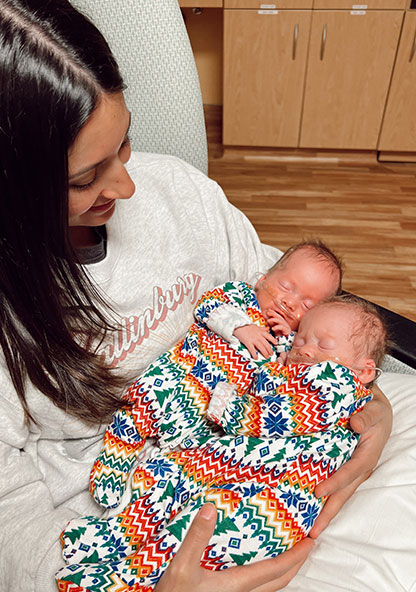Blossoming Resilience: A NICU Journey of Twins, Triumphs and Gratitude
Destiny Killoran and her husband were looking forward to starting a family. They had been trying for a few months and she still wasn’t pregnant. She was a little concerned that maybe it was taking too long, so she shared that with her primary care doctor. He didn’t seem too worried.
“He said, ‘You do not need to worry until we hit a year.’ Then, a few weeks later I was pregnant,
said Destiny.
Destiny’s joy multiplied when she discovered they were expecting not one, but two girls. For the next six months, Destiny’s pregnancy went well. She didn’t have any complications. Then suddenly at 28 weeks she started to experience contractions.
Concern crept in because, well, who plans for contractions at 28 weeks? At first, I just brushed it off as a little bit of pain. When they progressively worsened, I knew that I had to go to the hospital,
said Destiny, “I knew it was too early.”
An Early Delivery
After Destiny arrived at CHRISTUS Santa Rosa Hospital—San Marcos, doctors determined she was going into labor and at just 28 weeks, Destiny and her husband welcomed Scout and Cambrie to the world.
The babies were delivered via Cesarean section. Given how premature the twins were, doctors determined the twins would need specialized pediatric care. Moments after they were born, Scout and Cambrie were transferred to CHRISTUS Children’s in San Antonio. Destiny was not able to hold the babies before they were transported by helicopter.
I felt a mix of fear and relief as I watched my newborns being whisked away by a helicopter to another hospital right after delivery. Despite the initial shock, I trusted the dedicated team at CHRISTUS Children’s. I knew they would provide the best possible care for my precious babies,
shared Destiny.
Babies delivered prematurely face a range of potential health challenges due to underdeveloped organs and systems. The CHRISTUS Children’s Level IV Neonatal Intensive Care Unit (NICU) has a large group of specialists to support premature babies including cardiologists, pulmonologists, physical therapists, occupational therapists, speech therapists, and respiratory therapists.
Once Scout and Cambrie arrived at CHRISTUS Children’s they were taken to the NICU and provided around-the-clock care to improve their lung function. Destiny knew the journey was just beginning.
Learn More
Gaining Lung Strength
Both Scout and Cambrie had underdeveloped lungs. Cambrie was the most critical; she was intubated, while Scout was placed on a Continuous Positive Airway Pressure (Bubble CPAP) to support her lungs.
Intubation for a Premature Baby
Intubation for a premature baby involves placing a breathing tube into the trachea (windpipe), a procedure known as endotracheal intubation. The tube helps to provide respiratory support for an infant who may have difficulty breathing on their own. Premature infants, born before 37 weeks of gestation, often have underdeveloped lungs and respiratory systems, making them more susceptible to breathing challenges. Intubation in premature babies can be necessary for various reasons, including respiratory distress syndrome, which is common in premature infants due to a lack of surfactant in their lungs. Surfactant is a substance that helps the air sacs in the lungs stay open, and its deficiency can lead to difficulties in breathing.
Bubble CPAP is a medical therapy used to support infants with respiratory difficulties, particularly those born prematurely or with underdeveloped lungs. This non-invasive technique helps keep the baby's airways open and improves lung function. During Bubble CPAP, the baby wears a small nasal prong or mask. The prong is connected to a machine that delivers a continuous flow of air or blended oxygen. The key feature of Bubble CPAP is the addition of small bubbles to the expiratory limb of the CPAP circuit. These bubbles create a gentle, oscillating pressure in the baby's airways, preventing the lungs from collapsing during exhalation and promoting a more consistent exchange of oxygen and carbon dioxide.
Dr. Maria Pierce, a neonatal physician at CHRISTUS Children’s, specializes in treating premature babies with underdeveloped lungs.
Treating twins in the NICU, one on bubble CPAP and the other intubated, is a delicate balancing act. Each tiny life presents its own set of challenges, and our approach is personalized to ensure the best possible care. Every adjustment in respiratory support is a meticulous decision, guided by the unique needs of each newborn,
said Dr. Pierce.
Day after day, Destiny saw the twin’s health improving. They each reached pivotal milestones. Cambrie was no longer intubated, and Scout’s condition improved; she no longer needed the Bubble CPAP.
As a parent in the NICU, you go down the ladder of respiratory support. In the NICU, there are levels, and once you achieve one milestone you go to the next. The skilled and compassionate nurses provided our babies with around-the-clock care,
said Destiny, We are just so tremendously grateful.
Overcoming initial breathing difficulties, preterm twins Scout and Cambrie navigated a nine-week hospital stay, progressing from respiratory challenges to conquering feeding obstacles. Approaching their 37th week, the twins, with the support of dedicated medical professionals, were deemed ready to go home. This transition marked the end of a challenging chapter and the beginning of a hopeful new one.
Home for the Holidays
Cambrie and Scout arrived home on December 13, 2023, just in time for Christmas.
They spent Halloween and Thanksgiving in the hospital, so it was so wonderful to have them home for Christmas and New Years,
said Destiny.
For the first couple of weeks, it took a bit of adjusting but right around Christmas, things got easier as they fell into a routine.
They really are easy babies. My husband says I spoil them, but how can you not? They spent the first nine weeks of their lives in the hospital. I want to spoil them now that they’re home,
said Destiny.
Every day, Destiny finds herself reflecting on the journey her family and her babies experienced. From the unexpected early delivery at 28 weeks to the heart-wrenching sight of her newborns being whisked away in a helicopter, the rollercoaster of emotions was indescribable. Now to make it through to the other side, Destiny attributes the success to the exceptional team at CHRISTUS Children’s.
We extend our heartfelt gratitude to Dr. Maria Pierce and the exceptional team of nurses in the NICU, whose unwavering expertise, compassion, and dedication have been instrumental in guiding our precious twins towards health and resilience. I can’t thank them enough for their invaluable support and commitment, ensuring our twins received the best possible care.
Additionally, something unexpected happened. Destiny gained a new insight into the impact that she has on her patients, as a nurse herself. The experience of being the mother of two tiny patients provided a fresh perspective, casting a new light on her critical role as a health care professional.
I always knew that I was so important to my patients, but being in the CHRISTUS Children’s NICU, experiencing the exceptional care, seeing how much I depend on their support and leaned on them, that only made me a better nurse.
Learn more about the NICU at CHRISTUS Children’s.



